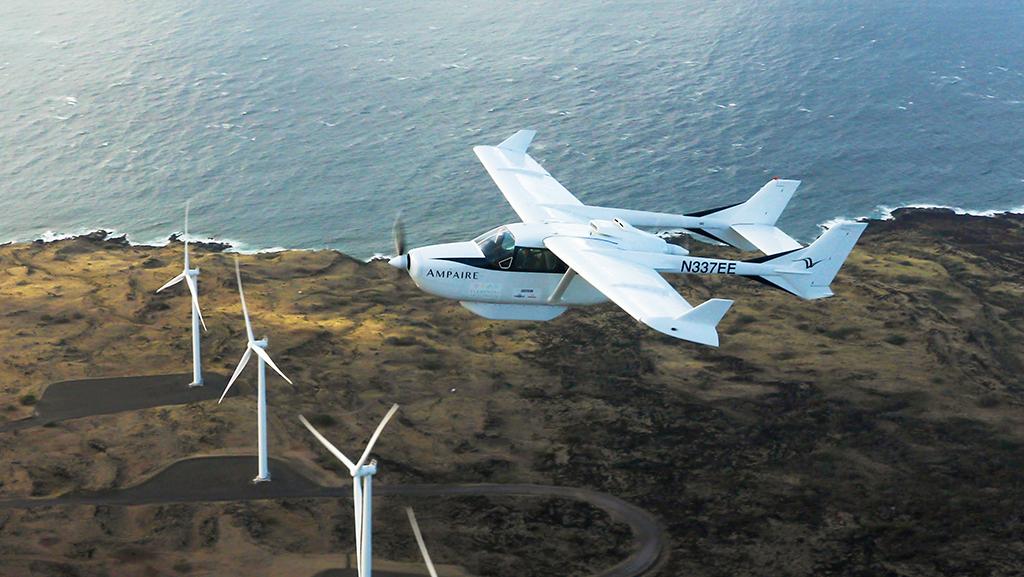
To many, Surf Air Mobility’s acquisition of hybrid-electric aircraft pioneer Ampaire may seem to be small news. Neither company is a household name. But if their plans succeed, the deal could prove to be a milestone for regional aviation and electric aircraft.
Proponents of electrified aircraft propulsion theorize the resulting significant reductions in operating costs, emissions and noise will lead to a renaissance in short-range, point-to-point service between smaller communities. The acquisition of Ampaire by a company focused on accelerating and expanding the use of sustainable propulsion in commercial aviation will be a litmus test for the theory.
Turboprop commuter
California-based Surf Air is a small but respected airline that offers commuter service for a monthly subscription, flying Pilatus PC-12 turboprops. In 2020, the company acquired BlackBird, an aviation marketplace that enables passengers to charter flights on private aircraft. Surf Air Mobility was born out of the transaction, with ambitions to do more than just operate aircraft.
“Are we going to convert our planes, and only our planes, then buy another 500 aircraft and rule the world?” Surf Air Mobility president Fred Reid president asks rhetorically. “I’ve been in aviation long enough to know that would be a spectacularly terrible idea. So we really believe that the North Star is the expansion of hybrid platforms across the world.”
Reid is an industry veteran. His previous roles include president at Lufthansa, president and COO at Delta Air Lines, founding CEO of Virgin America and president at Flexjet, the former Bombardier business-jet fractional ownership program. Reid joined Surf Air Mobility from Airbnb but first gained experience of electric propulsion as president of the Cora air-taxi program at Kitty Hawk.
Hybrid-electric
Ampaire, meanwhile, is one of a raft of startups founded within the past five years to bring electric propulsion to aviation, starting with hybrid-electric power trains for short-range regional aircraft because they are within reach of the technology available. The Californian company is developing propulsion retrofits for nine- to 19-seat piston and turboprop aircraft.
“What is available now is hybrid-electric. We see it as a steppingstone to fully electric propulsion, starting with 19 seats or fewer,” Reid said. “The upgrade is relatively cheap and will add 10-25 years life to the airframe. For roughly the cost of an engine overhaul in a King Air, PC-12, Caravan or Twin Otter you will get a reduction of 60-90% in fuel consumption and 25-35% in overall operating cost.”
Ampaire has taken an early lead in the nascent market, converting the six-seat Cessna 337 Skymaster into a flying testbed for its parallel hybrid power train. In late 2020, the aircraft was flown daily between Kahului and Hana Airports on Maui, a route operated by Hawaiian regional Mokulele Airlines, to validate the fuel savings from using batteries to augment the combustion engine for takeoff and cruise.
The startup is now developing its first commercial product, the Eco Otter SX, a hybrid-electric conversion of the 19-passenger de Havilland Canada Twin Otter planned for supplemental type certification in 2023. A modification for the 9/11-seat Cessna Caravan is also in the works. Stated range is just 200 mi., but Reid notes the Skymaster testbed has flown 340 mi., showing the potential of hybrid propulsion.
Through its acquisition of Ampaire, Surf Air Mobility plans to offer hybrid-electric upgrades for more than 30,000 certified piston- and turboprop-powered aircraft in service that it sees as suitable for conversion. “We see those as low-hanging fruit,” says Reid.
“In terms of piston planes and turboprops, the number one hindrance to the wider use of those aircraft in the commercial arena—and the sweet spot we’re looking for is 50-500 mi.—is cost. That and damage to the environment,” he said.
“Some people might say I’m not getting on that plane because of the environment, but they will say I’m not getting on that plane because it’s a little more expensive than a 300-mi. ride in UberX. But we expect to change that.”
Ampaire and Surf Air Mobility are not the only companies to see potential in hybrid-electric propulsion to reboot regional transportation by dramatically reducing operating costs. French startup VoltAero is developing the clean-sheet Cassio family of four-to-10-seat aircraft and aiming to begin deliveries by the end of 2022 to link smaller cities in France and elsewhere that are not well connected by high-speed rail or commercial air service.
Programs also have been launched to convert aircraft ranging from the 10-passenger Britten-Norman Islander to the 40-passenger de Haviland Canada Dash 8 to hybrid-electric or hydrogen-electric propulsion, targeting service entry in 2023-25.
All-electric nine- to 19-passenger aircraft are already under development but, while battery technology is certain to improve, Reid sees a long life ahead for hybrids.
“Our first product will not require chargers or infrastructure,” he said. “And our certification path is not easy, but it’s very practical and feasible.”





